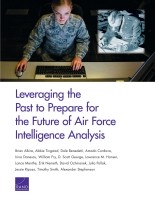| 来源类型 | Research Reports
|
| 规范类型 | 报告
|
| DOI | https://doi.org/10.7249/RR1330
|
| ISBN | 9780833092854
|
| 来源ID | RR-1330-AF
|
| Leveraging the Past to Prepare for the Future of Air Force Intelligence Analysis |
| Brien Alkire; Abbie Tingstad; Dale Benedetti; Amado Cordova; Irina Elena Danescu; William Fry; D. Scott George; Lawrence M. Hanser; Lance Menthe; Erik J. Nemeth; et al.
|
| 发表日期 | 2016
|
| 出版年 | 2016
|
| 页码 | 150
|
| 语种 | 英语
|
| 结论 |
The Team Identified Lessons About Building Analytic Foundations- Many processes, such as critical thinking, can be employed across different missions and levels of intelligence.
- Knowledge required to provide context is lacking or limited to support Air Force missions other than irregular warfare.
- Success in operations depends on analyses conducted across multiple timelines, organizations, and levels of war. They build on one another and require integration.
- Roles and responsibilities for analysis activities to support phase 2/3 operations in air, space, and cyberspace are not well defined or practiced.
The Team Identified Lessons About Building Partnerships- Joint, national, and partner analytic capabilities and capacities are not sufficiently leveraged.
- Guard and reserve contributions have been important but could be better utilized and are hindered by integration challenges.
- Integration of general-purpose and special operations force capabilities has resulted in more successes for both forces.
The Team Identified Lessons About Developing and Employing Skills- The United States has repeatedly faced unplanned security challenges.
- It has been difficult to balance development of analytic expertise with career progression milestones.
The Team Identified Future Challenges- The pace of future conflicts could stress needs for foundational intelligence and challenge readiness to conduct analysis during phase 2/3 operations.
- Analysts might need more expertise with intelligence from and for the space and cyberspace domains because operations in those domains might be more prominent.
- The volume of data and limitations on collection that anti-access and area-denial developments impose will challenge analysts.
|
| 摘要 |
- Define the roles and responsibilities of analyst airmen: Form a committee to federate roles and responsibilities for analysts across the enterprise and use programs of analysis or similar to document them, and update doctrine to better reflect analysis for operations in addition to irregular warfare.
- Train and develop analyst airmen: Create an intelligence analyst professional development program spanning multiple Air Force specialty codes; develop requirements for new mobile training team courses on cyber and space intelligence, surveillance, and reconnaissance, and an analysis refresher; modify the existing critical-thinking course; institutionalize mentorship and exchange of knowledge between analysts; and increase priority of select assignments within the joint and national communities.
- Equip analyst airmen with tools: Fully support the intelligence community information technology enterprise; increase investments in single-intelligence tools; and foster user-driven analytics for multi-intelligence tools.
- Invest in readiness of the analyst force: Expand the scope of existing or develop new exercises in order to practice analytic activities for operations other than irregular warfare.
|
| 主题 | Asymmetric Warfare
; Intelligence Analysis
; Military Intelligence
; United States Air Force
|
| URL | https://www.rand.org/pubs/research_reports/RR1330.html
|
| 来源智库 | RAND Corporation (United States)
|
| 引用统计 |
|
| 资源类型 | 智库出版物
|
| 条目标识符 | http://119.78.100.153/handle/2XGU8XDN/108336
|
推荐引用方式
GB/T 7714 |
Brien Alkire,Abbie Tingstad,Dale Benedetti,et al. Leveraging the Past to Prepare for the Future of Air Force Intelligence Analysis. 2016.
|
|
文件名:
|
x1495316313157.jpg
|
|
格式:
|
JPEG
|

|
文件名:
|
RAND_RR1330.pdf
|
|
格式:
|
Adobe PDF
|
除非特别说明,本系统中所有内容都受版权保护,并保留所有权利。